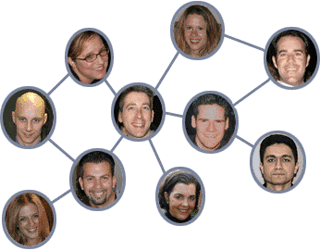
(also check out Part 1)
Most people who say that they would give up their liberty for temporary safety justify their opinion by saying “innocent people have nothing to hide”.
But I wouldn’t be so sure. There are lots of ways a perfectly law-abiding American can get swept up by this program, both accidently and deliberately.
Think about Six Degrees of Kevin Bacon. Think about your social network on Friendster or MySpace and imagine how many clicks it would take to get from your profile to the profile of, say, a serial killer, a pedophile, or a terrorist sleeper agent. Probably not that many, really.
We’re ALL connected.
Are you now or have you ever been:
- A member of a political party that is not the current party in power?
- Friends with a person who uses or sells illegal drugs?
- An employee in the military or technology sectors?
- A journalist who covers international or political affairs?
- A Muslim?
- An employer of, or a friend of, an illegal immigrant?
- A consumer of pornography?
- A psychiatric patient? A patient at a family planning clinic? An STD clinic?
- A member of any political organization or group on any part of the political spectrum, such as Greenpeace or the National Rifle Association?
- Involved in a lawsuit with the government or someone who works for the government?
No? None of these describe you? Does it describe anyone you know, your friends or members of your family? What about their friends and family?
As I pointed out in an earlier post, if you are even a handful of steps away from anyone in the above groups, you are probably now, to some degree, on a list of names to “watch”. If you are a member of a mainstream political group which has members who are also members of more radical political groups, then you are effectively “connected” to those people. If your first cousin went off the deep end a few years ago and became a drug addict or a gun nut, then you are “connected” to that person just as surely as Zacharias Moussaoui was “connected” to Osama bin Laden.
Bad things CAN be done with this information.
You say, “Okay, big deal, so I’m on a government list. They won’t do anything to me unless I’ve done something wrong.” Well, it was only a generation or two ago that such lists were used to prevent some Americans from getting jobs because of their political history. They were used to blackmail political opponents of the government and civil rights leaders.
If you are only one or two (or even three or four?) clicks away from any of the demographic groups listed above, this government or a future government could do all kinds of things to make your life miserable. They could:
- Subject you to extra screening at airports.
- “Challenge” your voter registration on election day.
- Harass your employer with questions and subpoenas.
- Prevent you from working for the government or government contractors.
- Subject you to IRS audits.
- Prevent you from attending public gatherings.
They could do many of these things without you or anyone else even knowing how or why. They could, of course, do worse and arrest you without charges now that the Bush Administration has laid the legal groundwork for doing precisely that.
If you worry about freedom of the press, think about this story from the ABC News blog this morning:
A senior federal law enforcement official tells ABC News the government is tracking the phone numbers we (Brian Ross and Richard Esposito) call in an effort to root out confidential sources.
Is it hard to imagine that the government could use the NSA’s system to make journalists afraid to call their anonymous sources? Journalists get calls from people with some pretty shady connections sometimes, and these people may sometimes reveal things that the politicians in Washington don’t want revealed. Do we really trust the government to not harass (or worse) journalists who are working on stories they don’t want to see printed?
It’s NOT just for use by the Bush Administration.
Are you a loyal flag-waving, law-abiding American? Are you a Republican who never said anything bad about the Bush Administration? If you just use your imagination a little, I think you will get pretty mad, too.
For example, do you think it’s possible that a future radical Democratic President or Congress might decide to trigger secret IRS audits on all people who were “connected” by phone records to conservative tax-reform organizations, under a pretext of fighting tax fraud? Could they cross reference everyone who ever phoned a gun dealer with everyone who ever phoned an anti-abortion activist group, and then decide to round up the guns from all Americans “connected” to these anti-abortion groups under a pretext of fighting domestic terrorism?
Can you trust the government not to hand these lists and the results of their analysis over to a foreign government? To private companies who want to sell you stuff or monitor your buying habits?
It baffles me that people on the right can support this program after everything they complained Bill Clinton and Janet Reno were doing a decade ago, which in retrospect looks positively quaint in comparison.
Go to “NSA Data Mining 1: If you aren’t against it, then you don’t really understand it.”
Go to “NSA Data Mining 3: Wiretaps? Maybe not. Stakeouts? Definitely.“
Comments
One response to “NSA Data Mining 2: So you think you have nothing to hide?”
Well written Chris.
I have nothing to hide, I also have nothing to share with any government that is none of their business!